Most Recent
Most Recent
Most Recent
Most Recent
Most Recent
Most Recent

When it comes to building a competitive advantage in the increasingly saturated world of digital commerce, customer experience is going to be the difference-maker.
Digital commerce is riding the wave of new technology. Winning brands are innovating ways to leverage these technologies to provide their customers with frictionless experiences that drive brand loyalty and maximize profits.
Businesses are using technology to reduce costs through automation, maximize sales through machine learning and artificial intelligence, and increasing the speed at which digital commerce operates. All of these advancements are fueling expected customer experiences online. Customers are expecting fast deliveries, easy returns, and a host of other experiences that make online business easier and better than offline.
 Source: Octal Software
Source: Octal Software
AI shopping assistants use machine learning algorithms to determine items that your customer may want and discovers cross-selling and up-selling opportunities based on their purchase history and product review scores.
Virtual shopping assistants can help drive customers to their purchasing decisions and help build customer loyalty.
Virtual shopping assistants are fantastic because they make shopping more comfortable, and with the power of suggestion, they reduce the rate of return on the cross-sells and upsells.
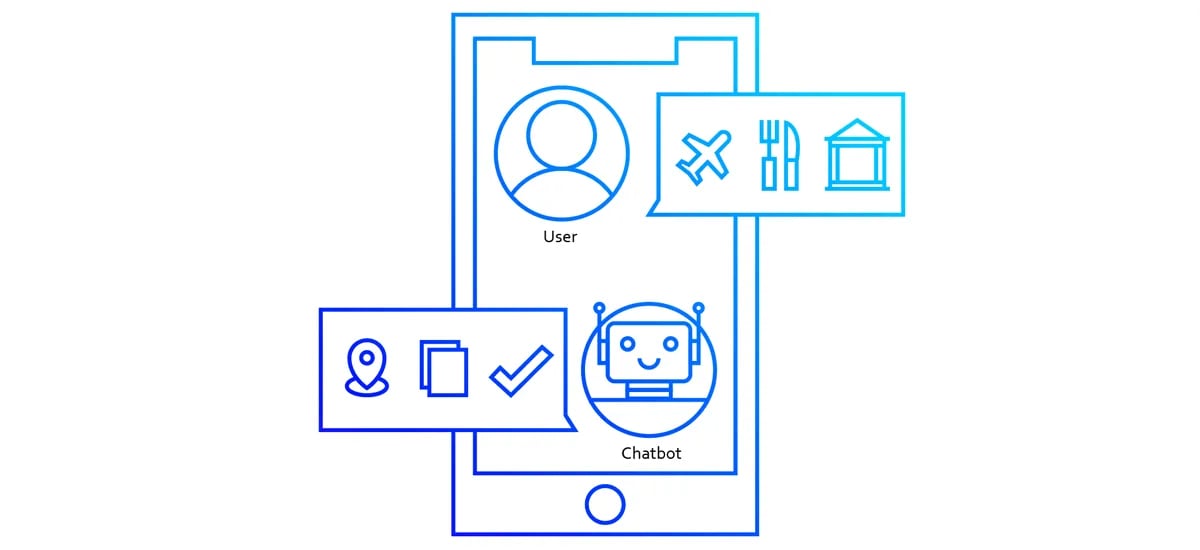
Chatbots can be programmed with all of the knowledge and general Q&A data, allowing customers to ask questions and get answers as if they were speaking to a human representative.
Chatbots can proactively engage customers or wait for the customer to initiate a chat session. They offer immediate response, which gives the customer a positive experience. And they can collect data on autopilot, in many cases much more efficiently than landing pages and sign up forms. Amazon’s chat functionality allows customers to make returns, get replacements, request refunds, and more, without ever having to speak to a customer service agent.
Chatbots can be omnichannel as well, spanning web chat, social media, and even text messaging.
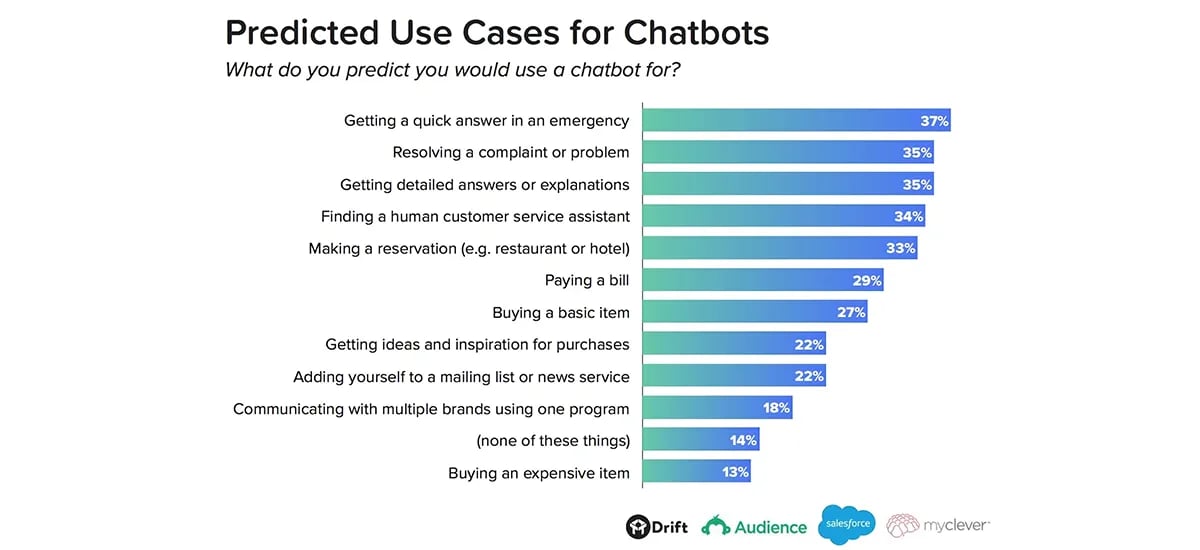 Source: Big Commerce
Source: Big Commerce
Especially since the worldwide pandemic of 2020, brick-and-mortar stores are bridging the gap with an eCommerce experience.
 Source: TechCrunch
Source: TechCrunch
Augmented reality is a technology that superimposes a computer-generated image on the shopper’s view of the real world. Customers get a much better idea of how a product fits or looks without going into the store.
Furniture retailers are adopting augmented reality at a very fast pace, with top brands already offering augmented reality features in their apps. You can see their furniture offerings sitting in your rooms, simply by looking at the world through your phone screen.
Clothing retailers are also jumping on the augmented reality bandwagon, offering multiple different ways to “try before you buy” their clothes without coming into the store.
Smart upsells and product promotions provide better shopping experiences by automatically suggesting products and promotions relevant to the current purchasing behavior, as well as user history.
An example of a smart product upsell is when someone is shopping online for a new camera, the upsell may be memory cards, carrying cases, lenses, and such.
Amazon includes a feature that shows products commonly purchased together.
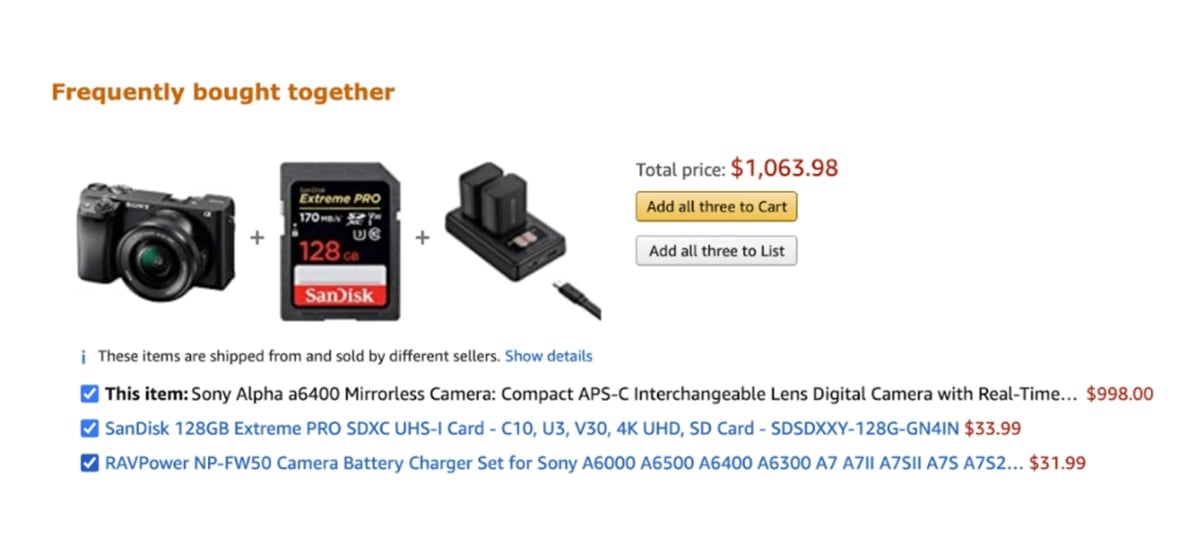
Source: Amazon
Installment payments are typically used to make big-ticket items more accessible in stores like Best Buy. The full cost is broken down into smaller recurring payments.
The third-party consumer financing company, Affirm, has become a must-have feature for brands that sell more expensive items. It's a platform that aggregates products across retailers and sells it on its own platform with the main purpose of allowing consumers to purchase the goods in installment payments.
Affirm has become a must-have feature for brands that sell more expensive items.
Affirm is a great example of a financing shift in the marketplace. Its application is easily integrated into most eCommerce platforms. The risk of financing is removed from the retailer and assumed by Affirm.
Affirm flips the traditional installment payment model on its head by offering premium goods, including retailers who don't have their own financing plan, and offering a much lower interest rate, thereby allowing premium retailers to access a wider consumer base than before.
A large part of delivering enhanced experiences to customers is through personalization. Technology and personalized devices have provided unique personal data that advanced companies have leveraged to create customized experiences for individuals. Now, that level of personalization is table stakes for a successful digital commerce experience.
Customer-centric search prioritizes results based on what's relevant to the specific visitor by sorting items in real-time based on previous purchases, previous searches, and current indicators, such as search intent.
This produces a much more engaging customer experience, which uses Artificial Intelligence (AI) and Machine Learning to automatically tailor the experience for each individual rather than segmenting based solely on general popularity.
The better your search function’s ability to predict customer intent, the more conversions you will have.The more efficient, quick, and predictive your search to checkout process is, the less opportunity there is for a customer to reconsider and leave, get frustrated, or get bored.
- Grace Carter of Trust Radius
A big part of Better Experiences is delivering the customer personalization, which has gotten more sophisticated due to the always-connected nature of personal technology.
Multi-device customer journeys represent 41% - 65% of all online purchases.
Smarter personalization allows for individualized offers and data to be shared across all the devices for each individual shopper. When someone moves from their tablet to their cell phone, for example, their shopping experience can migrate with their device choice at the moment.
If a customer is browsing dresses, and a pop-up ad appeared for a coupon on the latest dresses, the customer is much more likely to purchase. Gartner predicts that “engines that gauge and react to customer intent will be capable of boosting eCommerce profits as much as 15 percent” by the end of the year.
Stitch Fix, for example, uses a combination of human stylists plus customer and product data to choose clothing options for their customers.

Source: Stitch Fix
Customer-centric geolocation tailors the shopping experience according to customer location. Getting accurate delivery times and in-stock products, based on their geolocation gives customers confidence their order will arrive and that they will get it on time as well.
Perhaps the customer is searching for something online from a retail store with multiple locations and prefers curb-side pickup. A positive experience would be the website choosing the nearest location (or best location based on past preferences) to prepare the order for pickup without added steps or tasks for the customer to complete their purchase.
Curbside Delivery:
Brands like Target and Home Depot were already offering online shopping with curbside pick up where the customer didn’t have to leave their car to pick up their items.
Curbside delivery service adoption has increased swiftly with stores being unable to open for customer traffic. And, the positive response from customers means it’s not a temporary offering for most retailers.
Just Walk Out Shopping:
Amazon launched the Amazon Go store in Seattle to a lot of fanfare. This store offers a “just pick it up and leave” experience. Customers scan their Amazon app when they enter the store, they pick up items they want, and walk out.
According to the Amazon Go website, the technology (computer vision, sensor fusion, deep Machine Learning) isn’t unique. It’s the same found in self-driving cars, just repurposed for the shopping experience.
Smart Shopping Carts:
Building a store with all the technology of Amazon Go is expensive for the moment. Amazon has also set the pace by building a smart shopping cart, the Dash Cart, for other stores.
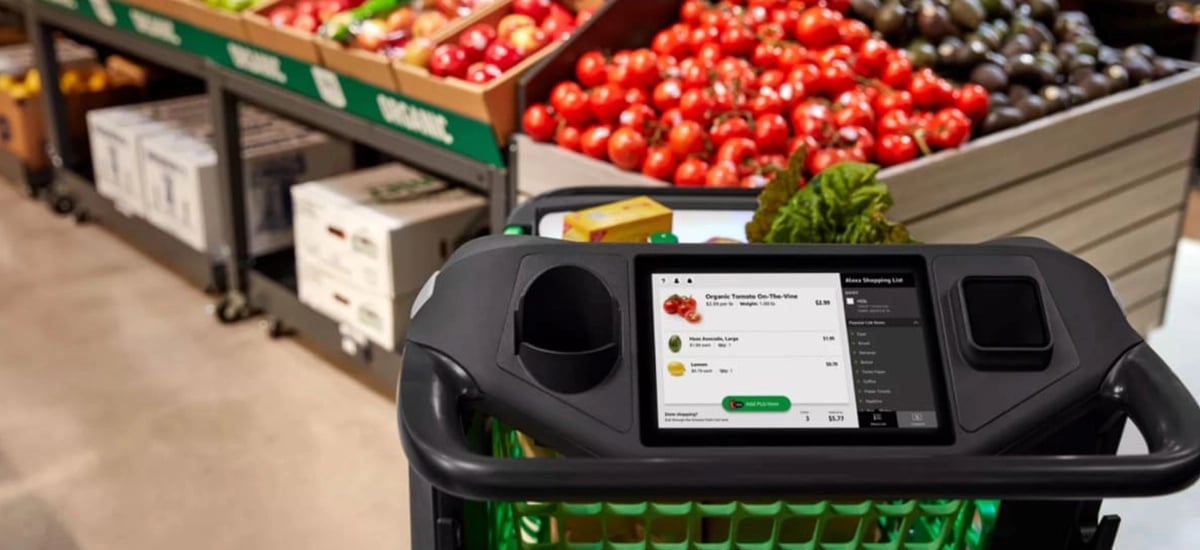 Image Source: Amazon
Image Source: Amazon
While not truly “just walk out,” the smart shopping cart allows customers to skip the checkout lines completely.
![]()
The cart processes your order at the end of the trip only because you’ve first signed in to your Amazon account on your phone and scanned it at the beginning of the grocery trip.
The cart also has a coupon scanner built-in and supports Amazon’s Alexa shopping lists feature. When you finish shopping, Amazon says dedicated Dash Cart lanes let you just exit the store without dealing with payments or waiting in a checkout line.
Virtual Video Experiences:
Some companies are making smart glasses and headsets that allow their in-store associates to engage with online shoppers in a hybrid virtual experience.
 Source: GoInstore
Source: GoInstore
![]()
Some retailers are using wearable technology to make online shopping feel more like shopping inside a real-world store.
Companies like Epson and Go Instore are making smart glasses and smart headsets that human sales associates wear when they’re engaging with online shoppers. Smart glasses give associates the ability to engage with shoppers who are online in the same way they would engage with shoppers in person, even demonstrating how products work using real-time video tools.
- StreetFightMag.com, eCommerce media outlet
 Source: Medical Device Network
Source: Medical Device Network
Wearable tech devices are starting to connect much more deeply in the shopper’s everyday life. With this more in-depth integration, retailers find new opportunities to engage with their customers by learning their habits.
Examples of wearable tech are smartwatches, rings, bracelets, and wearable items such as body-mounted sensors, AR headsets, clothing, and other connected devices.
Household tech, also known as smart home devices, connect via the internet of things. They are appliances and devices used within a customer's household (like a refrigerator) that go beyond their traditional purpose.
Over the last few years, household tech has become much more important to consumers. Especially with a lot of companies moving to telecommute, at least part-time, consumers are looking for ways to augment their home experience.
Newer technology has enabled people to do more things in their homes vs going out. Advanced home entertainment centers, and live streaming sports, on-demand food, and grocery delivery - all of these advancements have made staying at home more often both easier and more desirable.
Urbanization has also increased the need for more home security. Products like Ring and voice-activated devices that can make phone calls, and push notifications of security events have turned normal homes into highly secure safe spaces, even when the residents are not physically there.
There are other conveniences as well, such as Nest, telling Alexa to turn on the lights or preheat the oven to prep for dinner. All of these emerging household technologies are opening up opportunities for digital commerce companies. If a company can build a great home ecosystem (either closed or partnered) then it can win more customers and increase market share. Domino's was one of the first restaurants to have a skill on Alexa that allowed the consumer to order pizza delivery via voice activation.
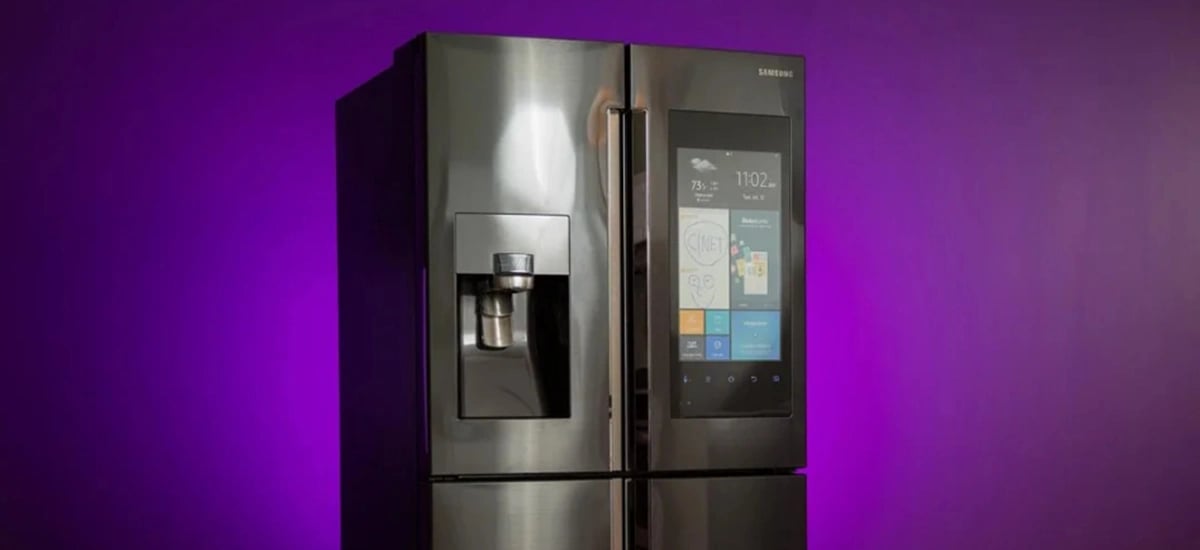 Source: CNet
Source: CNet
Another example of the merging of eCommerce and household tech is Samsung’s smart refrigerator. With this refrigerator came a partnership with Woolworths to let refrigerator owners buy groceries using the Woolworths app built into the fridge door.
Seamless omnichannel is the seamless integration of different methods of shopping experiences. It means a shopper can shop through an app, a website online, a physical store, or by telephone seamlessly.
A seamless omnichannel is awesome because it helps retailers build a better relationship with their customers across all points of contact. Giving customers options builds trust and loyalty.
The multi-channel experience is what most businesses have today. A business may have a website, Twitter, Instagram, Facebook, and Pinterest, and the retail marketing team would use them all to engage with their customers. However, the customer still lacks a seamless experience.
With omnichannel, all platforms and devices are taken into consideration. The knowledge is used to align their messages, designs, goals, and objectives across all their usable devices and channels, delivering an integrated experience to their customer.
The cost enhanced shopping experience, like personalization, is that companies own more and more of the consumer data in order to be able to provide them. However, all the data breaches over the past decade have degraded the brand value and consumer trust in those victimized brands.
Marriott, for example, purchased Starwood Hotels in 2016. Two years later, they revealed that the Starwood customer database had been hacked. The names, addresses, contact information, and passport numbers of over 300 million people were accessed.
Equifax is another shocking example of privacy apathy, as it failed to act on a known security vulnerability that was later hacked, and names, Social Security numbers, dates of birth, credit card numbers, and even driver’s license numbers were accessed. This breach resulted in a settlement of more than $700 million in lawsuits, not to mention the ongoing loss of trust in the brand.
Companies are increasing their cybersecurity precautions, and the pendulum is swinging to a much more informed consumer base that now dislikes the idea of giving as much data to companies as before. Federal privacy laws are a result of that shift, with legislation such as the GDPR and the CCPA making it more difficult for companies to keep personal identifying information (PII) on hand without consumers’ explicit permission.
Returns and support is the backbone of customer service. Without it, retailers would face a mass exodus of customers if they were unable to return an item they could not use or did not like.
Unlike in-store experience, where you can try on an item before you buy, purchasing online adds an assumption of risk. It opens up questions across retail departments:
Amazon, for example, allows you to return items, sometimes charging you for the return shipping. However, to skip the charge, you can simply drop off your package in one of the many lockers around major cities. Amazon has even partnered with Kohl's and the UPS Store to give an easy option for returning merchandise. You don’t even have to package your return up or buy a shipping label. You just hand it to the store employee and you’re done.
Giving customers a headache-free return experience is a giant leap in turning them into loyal eCommerce purchasers.
Artificial intelligence (AI) has been developed to battle fake online shopping reviews, which are easily identified by shoppers, but hard to combat. In the end, having a fake review problem reduces or eliminates the trust-building benefits of real reviews.
The problem is a difficult one to overcome, which is why eCommerce giants like Amazon are still trying to solve it. They have no shortage of technical resources, yet the problem still persists. And, according to a report from The Verge, as Amazon clamps down, the fake review networks are moving to other platforms.
Smart companies are now developing artificial intelligence and natural language processing to weed out fake reviews on autopilot.
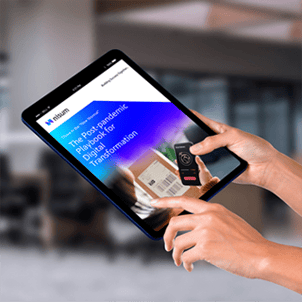
2020 brought a massive shift to consumer behavior. This is the playbook for companies that want to thrive in this "new normal."

Digital commerce will continue to evolve over the next decade, with advancements in every area of commerce. From product sourcing to supply chains and logistics, innovations continue to increase the speed at which we do business. None of those advancements, however, will make as big of an impact on brand growth as the technology that impacts the customer’s experience directly or indirectly.
The newer generation of consumers expect the Amazon experience from every brand, and sometimes they expect even more. Developing new ways to serve consumers is the fastest mechanism toward future gains in market share. And the technology that is already available is exciting!
Blockchain technology, for example, is already impacting the retail industry. Retail businesses using Blockchain appreciate supply chain visibility on their products. Retailers, like Walmart, implemented Blockchain to ensure food safety and quality. But it also helps track products and aids in preventing the purchase of counterfeit items.
Artificial intelligence and machine learning are also driving customer experience advancements in data-driven organizations. Consumers are already accustomed to ordering products by speaking to Amazon Alexa, for example. Alexa can hear the customer's request, and order supplies without the customer having to complete any additional steps.
Machine learning extracts real value from data and analytics for all kinds of exciting possibilities in commerce. Predictive analytics, for example, can automate customer segmentation, best or closest retail location, up-selling and cross-selling, demand forecasting, and dynamic pricing decisions.
Thanks to cloud technology, digital partnerships are easier than at any point in history. Digital commerce over the next decade will revolve around each company’s ecosystem.
An ecosystem that is built on in-house servers (like most legacy point of sale systems) for example, is closed and isolated. But customers today expect and demand features that require integrations with 3rd party partnerships. On-premises systems that aren’t open and integrated with the digital commerce world cannot provide the experiences customers expect.
You can’t have a fully-featured, on-demand shipping feature, for example, if you don’t integrate with shipping suppliers’ systems. There’s no way to automatically supply shipping rates, and delivery times based on each customer's individual demands per each transaction.
Supply chain integrations for things like inventory predictions and stock availability are important for customers.
Amazon, for example, can tell you when an out-of-stock item will arrive at your door by predicting when it will arrive from suppliers, predicting the time it takes to package and ship, and their prime delivery windows based on integrations with shipping partners.
If a customer knows a certain product will arrive in time for their deadline, they may go ahead and order from Amazon even if that item is not currently in stock, rather than shopping at another provider that has their item of choice in stock.
This single feature uses several integrations to deliver an important upgrade to a customer’s experience.
It can be exciting to talk about cutting edge technologies, like blockchain and machine learning, but there is one critical truth that must be understood: technology alone is not a digital strategy.
The technology in itself doesn’t win with consumer experience simply because you used the newest technology.
The real question is, did you build the right thing, and did you build that thing right?
Digital commerce is about integrating with the world. Every company, big and small, is looking to integrate their systems with their partners. These integrations are what will drive innovations in customer experience over the next decade.
To leverage innovation in digital commerce requires equal part expertise and creativity, brainstorming new ways to make customer experiences great. It takes knowledge and meticulous design to ensure these new developments are engineered to open companies to new opportunities, rather than boxing them in with short-sighted development.
This is where Nisum’s strategic partnership helps drive real breakthroughs in digital commerce. We have the experience and creativity to bring new customer experience breakthroughs to the table, while also understanding what a flexible ecosystem looks like, and how to develop solutions that open up possibilities in the future.
2020 brought a massive shift to consumer behavior. This is the playbook for companies that want to thrive in this "new normal."